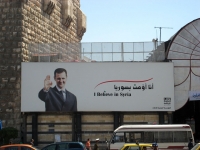French Tribunal Investigates Qosmos Over Surveillance Software Use In Syria

Qosmos - a French technology company - is being investigated for acting as an "assisted witness" in alleged torture in Syria. The specialized crimes unit of the Paris Tribunal has agreed to study the use of Qosmos surveillance software by Bashar Al-Assad's regime, following complaints filed by two human rights NGOs.
The International Federation for Human Rights (FIDH) and Ligue Des Droits de L'homme (LDH) accused Qosmos of supplying the Syrian government with Deep Packet Inspection (DPI) software to track, torture and execute dissidents after the initial uprising against the government began in 2011.
DPI is a type of data processing that collects detailed information on what a person sends and receives on computers in addition to whom and where the data is coming from.
Despite the fact that the software has legitimate uses in detecting viruses and tracking suspected criminals, critics argue that the potential risks involved with its misuse far outweigh the good.
The Assad regime is alleged to have used the software to scan emails, social media sites, browsing activities, key words searched and even real-time discussions - to eavesdrop on the Syrian population. Government security agents also allegedly intercepted live traffic feeds and created graphic maps of their citizens' electronic contacts.
"In selling this surveillance material, you cannot ignore its end use. Its equivalent to a weapon because it's a tool of repression to arrest and torture," said Patrick Baudouin, honorary president of FIDH, in a press statement after filing the initial complaint.
The two NGOs initially filed a joint complaint with the Paris Tribunal in 2012 to investigate the practices of French companies selling surveillance technology to authoritarian regimes, after WikiLeaks published documents linking Qosmos to a Syrian government surveillance scheme code-named the Asfador project.
The Asfador project is alleged to have started soon after the Arab Spring uprising against Assad began in early 2011 with the express purpose of tracking dissidents. Bloomberg reporters described how employees of Area SpA, an Italian surveillance company, set up a customized system for the Syrian intelligence that utilized technology from Qosmos in France, NetApp of the U.S. and , Utimaco Software of Germany.
The company admits that the software was considered for purchase by the Syrian government. "The mechanics of pulling out of this, technically and contractually, are complicated," said Erik Larsson, Qosmos head of marketing, to Bloomberg News in November 2011. Qosmos CEO Thibaut Bechetoille also indirectly confirmed his company's association with Assad's government, when he was quoted saying, "It was not right to keep supporting the regime."
A year later, Qosmos officials claim to have withdrawn from the Asfador contract. "The system was never put into operation," Qosmos said in an official statement on the company website. "Qosmos withdrew from the project in 2011 prior to completion and the system was unusable at the time of our withdrawal."
Activists are skeptical. They have welcomed the decision of the Paris Tribunal to look into the role of Qosmos in Syria.
"We hope that, with this new development, the inquiry will shed light on the conditions that allowed for the installation of a large-scale communications surveillance system benefiting the criminal regime of Bachar El-Assad, which used the system to harm the Syrian people," said Michel Tubiana, honorary president of LDH, in a press statement.
If the tribunal finds that the allegations are accurate, the executives of the company may face prison time under French law, according to Human Rights Watch.
This is not the first time a French company has been investigated by Paris Tribunal. A judicial investigation - the first of its kind for the newly created specialized crimes unit - was authorized after FIDH and LDH filed a complaint in October 2011 against Amesys, a subsidiary of Bull, for selling surveillance equipment to Muammar Gaddafi's regime in Libya in 2007.
Meanwhile five years after the peaceful demonstrations of the Arab Spring in 2011, the conflict in Syria has morphed into a full-fledged civil war with the government using violent tactics to defeat political dissidents and opposition fighters.
Human rights groups say that civilians have been strategically targeted by the regime in the form of kneel or starve campaigns, illegal detention, widespread torture, aerial bombardment of residential areas with conventional and chemical weapons and even the extermination of entire families. Over 11.6 million people have been displaced by the conflict and approximately 220,000 people killed according to the United Nations, half of whom are believed to be civilians.
A 2014 report published by Desmond De Silva and David Crane reveals the extent of torture and execution experienced by people incarcerated by the current Syrian regime. A Syrian army defector, dubbed Caesar, smuggled 50,000 photographs last year to the US government that depicted clear signs of brutality faced by over 11,000 executed detainees since the uprising began in March 2011.
Caesar - tasked with the job of examining and photographing up to 50 bodies of detainees a day for the past three years - revealed that starvation, strangulation, beatings, tramline bruises, inflicted injury and a high level of discoloration across bodies were common occurrences. An in-depth examination of 5,300 detainees showed 20 percent had inflicted trauma and over 40 percent experienced emaciation.
- 24 Intelligence



